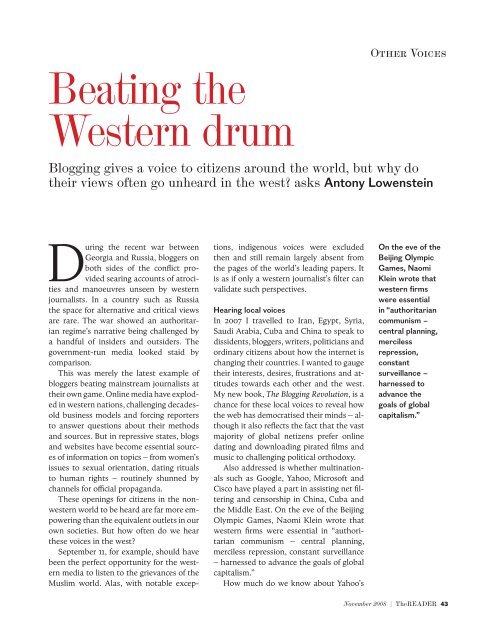Chris hedges AND george Monbiot ON THE IGNORANcE - ColdType
Chris hedges AND george Monbiot ON THE IGNORANcE - ColdType
Chris hedges AND george Monbiot ON THE IGNORANcE - ColdType
Create successful ePaper yourself
Turn your PDF publications into a flip-book with our unique Google optimized e-Paper software.
Beating the<br />
western drum<br />
other voices<br />
blogging gives a voice to citizens around the world, but why do<br />
their views often go unheard in the west? asks Antony lowenstein<br />
During the recent war between<br />
Georgia and Russia, bloggers on<br />
both sides of the conflict provided<br />
searing accounts of atrocities<br />
and manoeuvres unseen by western<br />
journalists. In a country such as Russia<br />
the space for alternative and critical views<br />
are rare. The war showed an authoritarian<br />
regime’s narrative being challenged by<br />
a handful of insiders and outsiders. The<br />
government-run media looked staid by<br />
comparison.<br />
This was merely the latest example of<br />
bloggers beating mainstream journalists at<br />
their own game. Online media have exploded<br />
in western nations, challenging decadesold<br />
business models and forcing reporters<br />
to answer questions about their methods<br />
and sources. But in repressive states, blogs<br />
and websites have become essential sources<br />
of information on topics – from women’s<br />
issues to sexual orientation, dating rituals<br />
to human rights – routinely shunned by<br />
channels for official propaganda.<br />
These openings for citizens in the nonwestern<br />
world to be heard are far more empowering<br />
than the equivalent outlets in our<br />
own societies. But how often do we hear<br />
these voices in the west?<br />
September 11, for example, should have<br />
been the perfect opportunity for the western<br />
media to listen to the grievances of the<br />
Muslim world. Alas, with notable excep-<br />
tions, indigenous voices were excluded<br />
then and still remain largely absent from<br />
the pages of the world’s leading papers. It<br />
is as if only a western journalist’s filter can<br />
validate such perspectives.<br />
hearing local voices<br />
In 2007 I travelled to Iran, Egypt, Syria,<br />
Saudi Arabia, Cuba and China to speak to<br />
dissidents, bloggers, writers, politicians and<br />
ordinary citizens about how the internet is<br />
changing their countries. I wanted to gauge<br />
their interests, desires, frustrations and attitudes<br />
towards each other and the west.<br />
My new book, The Blogging Revolution, is a<br />
chance for these local voices to reveal how<br />
the web has democratised their minds – although<br />
it also reflects the fact that the vast<br />
majority of global netizens prefer online<br />
dating and downloading pirated films and<br />
music to challenging political orthodoxy.<br />
Also addressed is whether multinationals<br />
such as Google, Yahoo, Microsoft and<br />
Cisco have played a part in assisting net filtering<br />
and censorship in China, Cuba and<br />
the Middle East. On the eve of the Beijing<br />
Olympic Games, Naomi Klein wrote that<br />
western firms were essential in “authoritarian<br />
communism – central planning,<br />
merciless repression, constant surveillance<br />
– harnessed to advance the goals of global<br />
capitalism.”<br />
How much do we know about Yahoo’s<br />
on the eve of the<br />
beijing olympic<br />
games, naomi<br />
klein wrote that<br />
western firms<br />
were essential<br />
in “authoritarian<br />
communism –<br />
central planning,<br />
merciless<br />
repression,<br />
constant<br />
surveillance –<br />
harnessed to<br />
advance the<br />
goals of global<br />
capitalism.”<br />
November 2008 | thereader 43
















